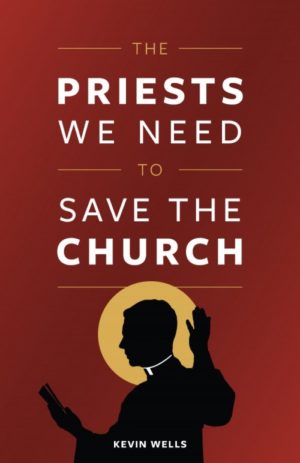|
Getting your Trinity Audio player ready...
|
At Christmastime, my older brother and I were remembering Stanley Wells, our grandfather who died in 1985 from Lou Gehrig’s Disease. It was he who was responsible, perhaps more than anyone, for the three generations of seventy or so Catholic family members gathered on Christmas night at our sister’s home.
Specifically, we talked about what occurred one day in 1959, when Stanley Wells was seated beside Jim Coffman on a car ride through Washington, D.C. Coffman, my grandfather’s new partner in their emerging masonry contracting company, mentioned in passing, “This is real work. I don’t know if I’m going to enjoy all that’s about to come our way.”
The following morning, Coffman was greeted at the office with the papers my grandfather had just drawn up that would forever separate Coffman from the business. Stanley Wells—a daily communicant who prayed the Rosary regularly and held a fascination for philosophy and the saints—recognized the need to detach from a man he perceived could be a millstone. Poor ole Coffman—some 65 years later, Wells & Associates, Inc. has become one of the most enduring masonry outfits in the Maryland/D.C./Virginia corridor.
Orthodox. Faithful. Free.
Sign up to get Crisis articles delivered to your inbox daily
In the face of what seems a looming ’24 whirlwind in America and a fissuring Catholic Church, I’ve been thinking about what the wizened ones do—and why so many of them seem to have withdrawn from neighborhoods, dioceses, the universal Church, and even the world itself.
I was reminded of the vanishing aged and holy archetypes recently on the Feast of the Holy Family through Simeon and Anna. Luke sets in motion the idea that it was these temple dwellers’ sustained fasts, holy manner, and abiding prayer that enabled them to immediately recognize the hidden Savior. Simeon perhaps knew of Mary’s future travail because it was God, Himself, who prophesied to Mary through him. Anna, too, was perhaps able to recognize the promised One in the baby because “she never left the temple, but worshiped night and day with fasting and prayer” (Luke 2:37).
Similarly, I imagine, my grandfather knew to part with poor Coffman because he perceived looming danger. Perhaps his instinct came from something analogous to a sensus fidelium earned from his years of meditative prayer, contemplation of Our Lady, and through the Eucharist that he received daily. Who knows?
But I do know something ordered and tranquil rested peaceably deep within his soul. For years, he carried a quiet dignity on the dusty and mud-caked job sites he managed in a suit and fedora. Later, after work—over and over at the dining room table in the 1950s—he posed questions to his children regarding virtue, Scripture, and philosophy.
Before ALS did my grandfather in, he passed on to my father a thriving business that he and three of my brothers oversee today. But really, the extension of the company didn’t matter. It was the Catholic Faith he built as an heirloom into the souls of his five children that mattered. He took the Faith of his children deadly seriously. Stanley Wells was certainly a builder—just not the type for which he had earned respect.
It was at the Mass commemorating the Holy Family when I thought again of those 70-plus faithful (but still very sinful) family members who stood around my brother, a Catholic priest, while he led us in prayer on Christmas night. Twenty or so children below the age of 12 were there that Christmas night. I don’t know a single one of their parents—who are my siblings and cousins—who looks to Rome any more for support or advice in raising their Catholic family in a society that mocks, ignores, or rejects their lived faith.
Fatima’s Lucia warned in a letter to Italian Cardinal Carlo Caffarra at the end of her life that the devil’s final confrontation would come against the family. Who would have thought—through Fiducia Supplicans—that it would have been the Vatican to fling the hatchet at the heart of Mary that Simeon warned would be coming?
Caught within the tsunami to come in 2024 is the poor traditional family that must continue to keep above the fetid tide with so few protecting spiritual fathers. For some time now, the fading heirloom of old Catholic ways has had to overcome stories like Catholic presidential candidate Chris Christie, once an opponent of same-sex marriage, who recently said his views have shifted. Citing Fiducia Supplicans, he said, “even the Church is changing.” Not a single Catholic bishop publicly took him to task.
When I was a small boy, I revered Stanley Wells for the purest of reasons. Although he had gained respect for being an honest and successful contractor, I revered him for a different reason—he had silver hair, hard-earned from work and tender parenting. Naively, then, I imagined all silver-haired people had earned a certain unconditional and unspoken respect for their long years of work at raising children.
By this author:
Where are the silver-haired archetypes today—the wizened ones like Simeon and Anna, whose long-suffering, mortifications, and devotion to God enabled them a deeper understanding and a more penetrating view at unseen things. Does there even exist an older generation of aged prophets like Jeremiah and Ezekiel, unafraid to herald warnings and strategies to help overcome the chaos that lies ahead. How many Stanley Wellses are even around anymore—the wizened ones willing to work hard each day to build a faithful Catholic family?
Can the wearied Catholic family still find the grandfatherly-like Catholic wiseman today—the aged one it might gather round at the hearthfire to listen to stories and tonics that stir and warm their hearts. Are there still a few aged archetypes out there able to fill souls with panaceas, wisdom, and solutions carved from years of prayer and devotion to God?
After Fiducia Supplicans was released, I sought a wiseman, one who might ably lay out a path forward to overcome the crescendoing madness of the world and the growing plague of fatherlessness in the Church. It was an unexpected grace that I found one so quickly.
His name is David Torkington and, for the moment at least, I believe him to be one of the most important prophetic voices in the world. By way of introduction, a pint-sized bio: Torkington is an achy-boned Englishman with just a handful of years left in his 85-year-old rugby-battered body. He’s a semi-hermit who lives in the wilds of the New Forest in southern England.
Over the past half-century, he’s established himself as Europe’s foremost instructor on mystical theology. He’s authored many books and numberless articles on prayer and has led retreats for tens of thousands of clergy and laity throughout the world. Because he knows time is finite and he has little time to dawdle, he awakens like Secretariat in the starter’s gate each morning to metaphorically reach into his rib cage and pull out his beating heart as a proclamation of redirection to a troubled world. Come nearer to the heart of God, he pleads to anyone who might listen.
“It is meditative prayer,” he said. “If I had just a day left, it is all that I’d preach. Everything now must go to—and be received—from God.”
Is Torkington the Simeon in whom we’ve been waiting, the line-faced archetype in the Church we can gather round to keep warm during this long wintertime in the Church? Well, that’s for you to decide—but I believe he may well be.
Why? Because he proposes what by and large the Church no longer does. He begs the Church and its members to return to the way of prayer of the early Church—which was continually leaning one’s head against the inner chamber of the heart of Christ through contemplative prayer. Torkington mourns over the Church’s shunning of mystical prayer over the last century.
“Why would the Church turn away from the very prayer of Our Lady, Christ’s disciples, the early martyrs, and Church Fathers? Going to the heart of God is the only solution to what ails us,” he said.
When we make it a daily practice to work to find God in silent prayer, God begins to make His home within us—and we can begin to hear His voice. With His voice leading us, we can know how to become holy and respond to these dark times—but until we enter into this form of prayer of the early Church, it will be very difficult for us to understand and know how to overcome these troubling days.
Torkington has been praying contemplatively since he was a small boy, which means he’s been praying in this fashion for three-quarters of a century. It can be argued that Torkington has spent more time in silent prayer than any lay person on earth. He discovered the ancient way of prayer by accident when he began to beg God over and over to rescue him from his dyslexia that was causing him to fail exams. It was that intense period of time with God as a schoolboy that developed into an interior friendship that has deepened over the years.
Happily, Torkington remains a hard-working and jolly old soul who’s maintained the hardy and untamed spirit of a desert monk. I came to “know him” through his new 12-part free course on mystical prayer produced by Essentialist Press. The course is an omnibus on the inner workings of his mystic heart—and how listeners, too, might come to total union with God through contemplative prayer.
His myriad teachings and thoughts on prayer—far too comprehensive to describe in this space—offer a meditative escape hatch from the world’s pain while placing one in the presence of God. Over and over in his presentations, he shares a word, thought, or Dickens-like tale that lures listeners deeper into the way of mystical prayer. No stone in the soul is left unturned.
Torkington intends to use his remaining days imploring the worldwide faithful to return to the manner of prayer that made saints of Teresa of Avila, Bernard of Clairvaux, Bonaventure, John of the Cross, and many others.
Perhaps one of the reasons for the Church’s long-suffering, Torkington might say, is because hierarchy, seminary rectors, theologians, and the local parish priest have all but shoved mystical prayer behind padlocked church doors. Is it the rejection of this ancient form of prayer, Torkington might ask, that has caused our Church to come under what seems a piecemeal collapse—and is it the lack of God’s spoken inner voice that has left the universal Church with no answers to keep it from splintering?
“When God’s voice goes unheard,” Torkington said, “darkness comes quickly.”
[Editor’s Note: This article is the first in a series that offers the musings of the Church’s “wizened archetypes.” Wisdom gathered from the silver-haired faithful set should prove beneficial—and perhaps providential—in helping to set a course for 2024 and the future.]

